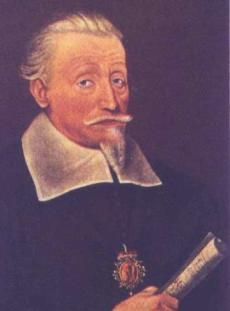|
|
Heinrich Schütz (October 9, 1585 – November 6, 1672) was a German composer and organist, generally regarded as the most important German composer before Johann Sebastian Bach and is often considered to be one of the most important composers of the 17th century along with Claudio Monteverdi. He wrote what is thought to be the first German opera, Dafne, performed at Torgau in 1627 (although the music has since been lost).
| Contents |
Life
Schütz was born in Köstritz; his extraordinary talent was discovered by Moritz von Hessen-Kassel in 1599. After being a choir-boy he went on to study law at Marburg, before going to Venice from 1609-1613 to study music with Giovanni Gabrieli. He subsequently had a short stint as organist at Kassel before moving to Dresden in 1615 to work as court composer to the Elector of Saxony.
He held his Dresden post until the end of his life (sowing the seeds of what is now the Dresden Staatskapelle while there), but left Dresden itself on several occasions; in 1628 he went to Venice again, most likely meeting Claudio Monteverdi there—he may have studied with him—and in 1633, after the Thirty Years' War had disrupted life at the court, he took a post at Copenhagen. He returned full time to Dresden in 1641, and remained there for the rest of his life. He died from a stroke in 1672 at the age of 87.
Style
Schütz's compositions show the influence of his teacher, Gabrieli, with their resplendent polychoral and concertato style, and of Monteverdi, whose music he had studied, though the influence of the Netherlandish composers of the 16th century is also prominent in his work. His best known works are in the field of sacred music, ranging from solo voice with instrumental accompaniment to a cappella choral music. Representative works include his three books of Symphoniae sacrae, the Psalms of David, the Sieben Worte Jesu Christi am Kreuz (the Seven Last Words on the Cross) and his three Passion settings, which he wrote just before his 80th birthday. While early in his life his music is mostly in the most progressive styles, later, culminating in his late Passion settings, his music is simple and almost austere, and often for small ensembles. Practical considerations were certainly responsible for part of this change: the Thirty Years' War had devastated the musical infrastructure of Germany, and it was no longer practical or even possible to put on the gigantic works in the Venetian style which marked his earlier period.
Almost no secular music by Schütz has survived, and no purely instrumental music at all, even though he had a reputation as one of the finest organists in Germany.
Schütz was of great importance in bringing new musical ideas to Germany from Italy, and as such had a large influence on the German music which was to follow. The style of the north German organ school derives largely from Schütz (as well as from Netherlander Jan Pieterszoon Sweelinck); a century later this music was to culminate in the work of J.S. Bach.
Works
The following are published works. Most of these contain multiple pieces of music; there are over 500 total surviving individual pieces by Schütz.
- Il primo libro de madrigali (first book of madrigals) (Venice, 1611)
- Psalmen Davids (Book 1) (Dresden, 1619)
- Historia der frölichen und siegreichen Aufferstehung ... (History of the Resurrection of Jesus) (Dresden, 1623)
- Cantiones sacrae (Freiberg, 1625)
- Psalmen Davids (Book 2) (Freiberg, 1628)
- Symphoniae sacrae (Book 1) (Venice, 1629)
- Musicalische Exequien (Dresden, 1636)
- Kleiner geistlichen Concerten (Book 1) (Leipzig, 1636)
- Symphoniae sacrae (Book 2) (Dresden, 1647)
- Geistliche Chor-Music (Dresden, 1648)
- Symphoniae sacrae (Book 3) (Dresden, 1650)
- Zwölff geistliche Gesänge (Dresden, 1657)
- Psalmen Davids (revision of Book 2) (Dresden, 1661)
Sources
- Manfred Bukofzer, Music in the Baroque Era. New York, W.W. Norton & Co., 1947. ISBN 0393097455de:Heinrich Schütz
eo:Heinrich SCHÜTZ fr:Heinrich Schütz nl:Heinrich Schütz pl:Heinrich Schütz li:Heinrich Schütz

